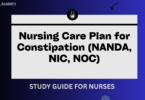Table of Contents
ToggleIntroduction
Hypothyroidism, a condition characterized by an underactive thyroid gland, can have significant implications for a patient’s health and well-being. Nursing management of hypothyroidism involves a holistic approach aimed at addressing symptoms, promoting optimal thyroid function, and supporting patients in managing their condition effectively. This comprehensive guide outlines key nursing considerations for the management of hypothyroidism, encompassing assessment, education, medication management, and ongoing support for patients and their families.
Assessment and Diagnosis:
A. Comprehensive Health Assessment:
- Thyroid Function Tests: Conduct a thorough assessment of thyroid function through laboratory tests, including thyroid-stimulating hormone (TSH), free thyroxine (T4), and triiodothyronine (T3) levels.
- Clinical Symptoms: Assess for signs and symptoms of hypothyroidism, such as fatigue, weight gain, cold intolerance, constipation, dry skin, hair loss, and menstrual irregularities.
- Medical History: Obtain a detailed medical history, including any previous thyroid disorders, autoimmune conditions, medications, and family history of thyroid disease.
- Physical Examination: Perform a comprehensive physical examination, focusing on thyroid gland enlargement (goiter), skin changes, vital signs, and signs of associated conditions like Hashimoto’s thyroiditis.
B. Differential Diagnosis:
- Rule Out Other Causes: Consider differential diagnoses such as thyroiditis, pituitary dysfunction, medication-induced hypothyroidism, and iodine deficiency.
- Collaboration with Healthcare Team: Work collaboratively with endocrinologists and other healthcare providers to confirm the diagnosis and determine the underlying cause of hypothyroidism.
Medication Management:
A. Levothyroxine Replacement Therapy:
- Patient Education: Provide education to patients regarding the importance of adherence to levothyroxine therapy and the need for lifelong treatment.
- Dosage Adjustment: Collaborate with healthcare providers to determine the appropriate dosage of levothyroxine based on thyroid function tests and clinical response.
- Monitoring: Monitor patients regularly for signs of medication efficacy, including resolution of symptoms and normalization of thyroid function tests.
- Timing of Administration: Instruct patients to take levothyroxine on an empty stomach, preferably in the morning, to maximize absorption and avoid interactions with food and other medications.
B. Adherence Support:
- Medication Counseling: Provide counseling and support to patients regarding the importance of consistent medication adherence and potential consequences of non-compliance.
- Patient Education: Educate patients about the significance of regular follow-up appointments and laboratory testing to monitor thyroid function and adjust medication dosage as needed.
- Addressing Barriers: Identify and address barriers to medication adherence, such as cost concerns, medication side effects, and misconceptions about treatment efficacy.
Symptom Management and Patient Support:
A. Symptom Relief:
- Fatigue Management: Encourage patients to prioritize rest and relaxation, establish a regular sleep schedule, and engage in gentle exercise to alleviate fatigue.
- Temperature Regulation: Provide guidance on maintaining a warm environment, layering clothing, and using blankets or heating pads to manage cold intolerance.
- Constipation Relief: Recommend dietary modifications, increased fluid intake, and regular physical activity to alleviate constipation symptoms.
B. Nutritional Counseling:
- Iodine Intake: Educate patients about the importance of adequate iodine intake for thyroid hormone synthesis and recommend iodine-rich foods such as seafood, dairy products, and iodized salt.
- Dietary Recommendations: Provide guidance on a balanced diet rich in fruits, vegetables, whole grains, and lean proteins to support overall health and well-being.
C. Psychosocial Support:
- Emotional Support: Offer empathy, reassurance, and emotional support to patients experiencing psychological distress related to their diagnosis and symptoms.
- Support Groups: Connect patients with support groups or online communities for individuals with hypothyroidism to foster peer support, information sharing, and coping strategies.
- Referral to Mental Health Services: Refer patients to mental health professionals for further evaluation and treatment of anxiety, depression, or other mood disorders associated with hypothyroidism.
Patient Education and Empowerment:
A. Thyroid Health Education:
- Understanding Hypothyroidism: Educate patients about the causes, symptoms, and complications of hypothyroidism to enhance their understanding and empowerment in managing their condition.
- Medication Education: Provide detailed information about levothyroxine therapy, including dosage, administration, potential side effects, and the importance of regular monitoring.
- Lifestyle Modifications: Offer guidance on lifestyle modifications such as stress management techniques, regular exercise, and smoking cessation to optimize thyroid health and overall well-being.
B. Self-Management Skills:
- Symptom Monitoring: Teach patients how to monitor their symptoms, track medication adherence, and recognize signs of hypo- or hyperthyroidism requiring medical attention.
- Healthcare Navigation: Empower patients to advocate for themselves within the healthcare system, ask questions during medical appointments, and seek second opinions or specialist referrals as needed.
C. Long-Term Care Planning:
- Follow-Up Care: Emphasize the importance of ongoing follow-up care with healthcare providers to monitor thyroid function, adjust medication dosage, and address any changes in symptoms or health status.
- Preventive Measures: Educate patients about the importance of preventive healthcare measures, such as regular thyroid screening, vaccinations, and annual physical examinations, to maintain overall health and wellness.
Nursing Interventions.
1. Enhancing Nutritional Status:
- Weight Assessment: Regularly assess the client’s weight to monitor for weight gain, which is common in hypothyroidism due to a slower metabolic rate.
- Appetite Evaluation: Assess the client’s appetite, which may be decreased in hypothyroidism, leading to reduced food intake.
- Food Diary: Provide a food diary to track the client’s dietary intake, helping to create an individualized nutritional plan.
- Client and Family Education: Educate the client and family about the relationship between appetite changes and weight gain in hypothyroidism, as well as the importance of calorie control during thyroid hormone replacement therapy.
- Collaboration with Dietician: Work with a dietician to determine the client’s caloric needs and develop a suitable meal plan.
- Meal Frequency: Encourage the client to consume six small meals throughout the day to maintain energy levels and nutrient intake.
- Assistance and Encouragement: Provide assistance and encouragement during mealtime to ensure adequate nutrient intake, especially considering the client’s decreased energy levels.
- Fiber-Rich Foods: Recommend foods rich in fiber to alleviate constipation, a common symptom of hypothyroidism.
- Low-Cholesterol Diet: Advocate for a low-cholesterol, low-calorie, and low-saturated-fat diet to manage lipid levels and support cardiovascular health.
2. Managing Fatigue:
- ADL Assessment: Assess the client’s ability to perform activities of daily living (ADLs) and note any fatigue or weakness experienced.
- Energy Patterns: Monitor the client’s daily energy patterns to identify optimal times for activity and rest.
- Muscle Strength and Tone: Evaluate the client’s muscle strength and tone, as hypothyroidism can lead to weakness and stiffness.
- Rest Periods: Plan care to allow for adequate rest periods tailored to the client’s energy levels and needs.
- Stimulation: Provide stimulation through conversation and nonstressful activities to prevent excessive fatigue.
- Comfortable Environment: Ensure the environment is conducive to relieving fatigue, considering the client’s sensitivity to cold temperatures.
3. Initiating patient education and health teachings:
- Knowledge Assessment: Assess the client’s understanding of hypothyroidism and its management, including thyroid hormone replacement therapy.
- Information Provision: Offer comprehensive information about hypothyroidism, its symptoms, and treatment options, adapting teaching methods to accommodate cognitive changes associated with the condition.
- Thyroid Hormone Education: Educate the client and family about thyroid hormone replacement therapy, emphasizing the importance of consistent medication adherence, timing, and administration on an empty stomach.
- Medication Instructions: Instruct the client to take thyroid hormone medication in the morning to avoid interference with sleep and on an empty stomach for optimal absorption.
- Regular Follow-Up: Emphasize the need for regular follow-up appointments and monitoring of thyroid function to ensure treatment efficacy and dosage adjustments as necessary.
Conclusion
Nursing management of hypothyroidism involves a holistic approach encompassing assessment, medication management, symptom relief, patient education, and psychosocial support. By addressing the diverse needs of patients with hypothyroidism and empowering them to actively participate in their care, nurses play a crucial role in promoting optimal thyroid health and overall well-being.
Read more: Nursing Care Plans
Read more: Nursing Management of Amputation: Comprehensive Patient Care








[…] Read more: Nursing Management of Hypothyroidism: Comprehensive Patient Care […]